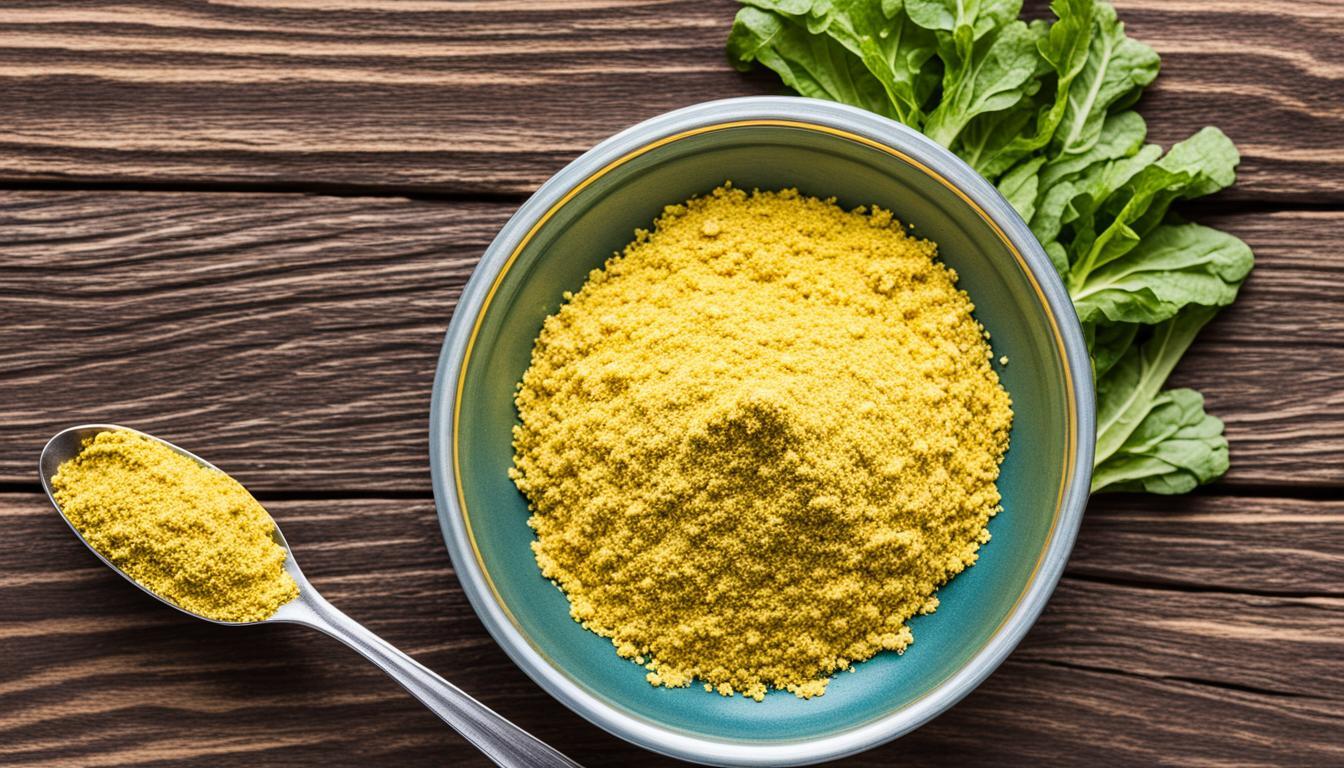Nutritional Yeast Benefits & Uses Explained

Nutritional yeast has gained popularity in recent years, particularly among vegans and those following a plant-based diet. It is a versatile ingredient that offers numerous benefits and has a range of uses in the kitchen. In this article, we will explore the various benefits of nutritional yeast and how it can be incorporated into different recipes. We will also discuss its nutritional profile, including its protein content, B-vitamin content, and other essential nutrients.
Additionally, we will explore the differences between nutritional yeast, brewer's yeast, and baker's yeast, as well as discuss potential risks and side effects. Finally, we will provide a shopping guide to help you choose the right nutritional yeast brand for your needs. Whether you're looking to boost your nutrient intake, add a cheesy flavor to your meals, or explore new vegan recipes, nutritional yeast is a must-have ingredient. Join us as we uncover the benefits and uses of this versatile and nutritious ingredient.

Key Takeaways:
Nutritional yeast is a versatile ingredient popular among vegans and those following a plant-based diet
It offers numerous benefits such as adding a cheesy flavor, boosting nutrition, and enhancing recipes
Nutritional yeast is rich in protein, B vitamins, and other essential nutrients
It differs from brewer's yeast and baker's yeast in terms of flavor, uses, and nutritional content
When choosing a nutritional yeast brand, consider whether you want fortified or unfortified options
Unveiling Nutritional Yeast: A Vegan's Secret Ingredient
Nutritional yeast, also known as "nooch," is a deactivated form of yeast that is often used as a vegan substitute for cheese. It is made from the same species of yeast that is used in baking and brewing, but it undergoes a heating and drying process that deactivates the live yeast cells. This process gives nutritional yeast its distinctive flavor and nutritional profile.
Nutritional yeast has a cheesy, nutty flavor that adds depth and richness to dishes. It is commonly used as a seasoning or topping for popcorn, pasta, salads, and more. The origins of nutritional yeast can be traced back to the brewing and baking industries, where yeast was traditionally used as a leavening agent. Over time, it was discovered that the inactive form of yeast could be used to enhance the flavor of foods and provide nutritional benefits.
Today, nutritional yeast has become a staple ingredient in many vegan and plant-based recipes, offering a cheesy flavor and added nutrients without the use of animal products. It is a versatile ingredient that can be used to create a variety of dishes and add a unique twist to traditional recipes. Whether you're vegan, lactose intolerant, or simply looking to explore new flavors, nutritional yeast is a secret ingredient worth discovering.
What is Nutritional Yeast And Why is it Popular?
Nutritional yeast is a versatile ingredient that has gained popularity among vegans and those following a plant-based diet. It is commonly used as a substitute for cheese, offering a similar cheesy flavor without the use of animal products. What sets nutritional yeast apart is its rich nutrient profile, making it a popular choice for those looking to add nutritional value to their meals.
Nutritional yeast is packed with protein, B vitamins, and minerals, making it a powerhouse of nutrients. It is an excellent source of complete protein, providing all nine essential amino acids that the body needs. This makes it a valuable option for vegans and vegetarians who may have limited sources of protein in their diet.
The popularity of nutritional yeast has grown in recent years as more people adopt vegan and plant-based diets. With its unique flavor and nutrient-rich profile, it has become a staple in many kitchens around the world. People are opting for nutritional yeast as a flavorful and nutritious alternative to traditional ingredients.
Nutritional Profile: What's Inside 'Nooch'?
Nutritional yeast is packed with essential nutrients that can support overall health and well-being. It is a great source of protein, providing all nine essential amino acids that the body needs but cannot produce on its own. This makes nutritional yeast a complete protein, similar to animal-based proteins. Additionally, nutritional yeast is rich in B vitamins, including thiamine (B1), riboflavin (B2), niacin (B3), pyridoxine (B6), and folic acid (B9). These vitamins are important for energy production, brain function, and the metabolism of carbohydrates, fats, and proteins. Nutritional yeast also contains other important minerals, such as zinc and potassium, which play a role in immune function and overall health. Overall, the nutritional profile of nutritional yeast makes it a valuable addition to any diet, particularly for those who are following a vegan or plant-based lifestyle.
Comparing Nutritional Yeast with Brewer's and Baker's Yeast
While all three types of yeast – nutritional yeast, brewer's yeast, and baker's yeast – are derived from the same species of yeast, they each have unique characteristics and uses.
Differences in Nutrient Content and Culinary Uses
Nutritional yeast, with its deactivated nature, is ideal for use as a seasoning or flavor enhancer, rather than a leavening agent. Its distinct cheesy and nutty flavor profile makes it a popular choice in vegan recipes. Brewer's yeast, on the other hand, is typically used in brewing beer and has a bitter taste. It is often sold as a nutritional supplement. Baker's yeast, commonly used in baking, helps dough rise and create a light, fluffy texture.
In terms of nutrient content, nutritional yeast takes the lead. It is the most nutrient-dense of the three, especially when it comes to B vitamins and protein. Additionally, nutritional yeast is often fortified with extra vitamins and minerals, ensuring an even higher nutritional value.
Understanding the Inactive Nature of Nutritional Yeast
Nutritional yeast, in its deactivated form, does not possess the ability to ferment or leaven like brewer's yeast and baker's yeast. This inactive nature makes nutritional yeast an excellent choice for adding flavor and nutritional value to various dishes without altering their consistency.
Continue reading to discover the health benefits of nutritional yeast and learn how to incorporate it into your diet for a delicious and nutritious culinary experience.
The Health Benefits of Nutritional Yeast
Nutritional yeast offers a range of health benefits, thanks to its rich nutrient profile. Some of the key health benefits of nutritional yeast include:
Supporting a healthy metabolism: The B vitamins in nutritional yeast help convert food into energy, supporting a healthy metabolism and maintaining consistent energy levels.
Boosting immune function: Nutritional yeast contains beta-glucan, a type of fiber that has been shown to strengthen the immune system and reduce the risk of infections.
Improving digestion: The fiber content in nutritional yeast can support healthy digestion and prevent constipation.
Promoting heart health: The fiber and B vitamins in nutritional yeast may help lower cholesterol levels and reduce the risk of heart disease.
Supporting brain health: The B vitamins in nutritional yeast are essential for brain function and can support cognitive health.
Maintaining healthy skin, hair, and nails: The B vitamins, zinc, and other nutrients in nutritional yeast can support the health and appearance of the skin, hair, and nails.
Incorporating nutritional yeast into your diet can be a simple and delicious way to enhance your overall health.
Nutritional yeast is a versatile ingredient that can be used in a variety of recipes to add flavor and nutrients. Here are some creative ways to incorporate nutritional yeast into your diet:
Sprinkle it on top of popcorn for a cheesy, savory snack.
Mix it into soups, stews, or sauces for added depth of flavor.
Add it to pasta dishes or macaroni and cheese for a cheesy twist.
Use it as a topping for roasted vegetables or salads to enhance their taste and nutritional value.
Blend it into vegan cheese sauces or spreads for a dairy-free alternative.
Incorporate it into homemade bread or pizza dough for a cheesy flavor.
Experimenting with nutritional yeast in your favorite recipes can open up a world of flavor and nutritional benefits. Don't be afraid to get creative and try new combinations – the possibilities are endless!
Unearthing the Immunity-Boosting Properties of Nutritional Yeast
Nutritional yeast has gained recognition for its immune-boosting properties, thanks to the presence of beta-glucan and antioxidants. The beta-glucan found in nutritional yeast is a type of fiber that has been linked to improved immune function. It stimulates immune cells, enhances their activity, and promotes the production of protective substances that can help combat infections and diseases.
The antioxidants present in nutritional yeast also play a role in supporting immune health. These antioxidants help reduce oxidative stress and inflammation in the body. By protecting cells from damage caused by free radicals, they strengthen the immune system's ability to ward off illnesses.
Integrating nutritional yeast into your diet can provide a natural and effective way to boost your immune system and promote overall well-being. Whether you sprinkle it on top of your favorite dishes or incorporate it into recipes, nutritional yeast offers a tasty and nutritious addition to your meals.
Integrating Nutritional Yeast into Your Diet
There are countless ways to incorporate nutritional yeast into your diet, whether you're looking to add a cheesy flavor to your favorite dishes or experiment with new recipes. It's a versatile ingredient that can elevate the taste and nutritional value of your meals. Here are some popular ways to use nutritional yeast:
Sprinkling it on popcorn for a cheesy, savory snack
Mixing it into pasta dishes or macaroni and cheese for added flavor and nutrition
Adding it to soups, stews, and sauces for a creamy texture and depth of flavor
Using it as a topping for roasted vegetables or salads to enhance their taste and nutritional value
Mixing it into homemade bread or pizza dough for a cheesy twist
Incorporating it into vegan cheese sauces or spreads for a dairy-free alternative
Experimenting with nutritional yeast in your favorite recipes can open up a world of flavor and nutritional benefits. Don't be afraid to get creative and try new combinations – the possibilities are endless!
Nutritional Yeast Vegan Recipes: A Universe of Flavor
Nutritional yeast is a staple ingredient in many vegan recipes, offering a cheesy flavor and nutritional boost without the use of animal products. There are numerous vegan recipes that feature nutritional yeast, including:
Vegan mac and cheese: Nutritional yeast can be used to create a cheesy sauce for macaroni and cheese made with plant-based ingredients.
Vegan cheese sauce: Nutritional yeast can be blended with plant-based milk, cashews, or other ingredients to create a creamy, cheesy sauce that can be used as a dip, spread, or topping for various dishes.
Vegan nachos: Sprinkling nutritional yeast on top of vegan nachos can add a cheesy flavor and enhance the overall taste.
Vegan pizza: Nutritional yeast can be added to the pizza sauce or sprinkled on top of vegan pizza for a cheesy, savory taste.
Vegan popcorn: Tossing freshly popped popcorn with nutritional yeast can create a delicious, savory snack with a cheesy flavor.
These are just a few examples of the many vegan recipes that can be enhanced with nutritional yeast. Whether you're following a vegan lifestyle or simply looking to incorporate more plant-based meals into your diet, nutritional yeast can add a universe of flavor to your dishes.
Potential Risks and Side Effects
While nutritional yeast is generally safe for most people, it's important to understand the potential risks and side effects associated with its consumption. Here, we'll delve into two crucial considerations: yeast allergies and possible interactions with medications.
Understanding the Yeast Allergy Paradigm
Individuals with a yeast allergy should exercise caution and avoid consuming nutritional yeast. When exposed to yeast allergens, these individuals can experience a range of symptoms, including itching, swelling, nausea, and difficulty breathing. It's important to be vigilant and consult with a healthcare professional if you suspect a yeast allergy or experience any adverse reactions after consuming nutritional yeast.
Medication Interactions and When to Avoid Nutritional Yeast
Nutritional yeast can potentially interact with certain medications, especially monoamine oxidase inhibitors (MAOIs) commonly prescribed for depression. It is advisable to consult with a healthcare professional if you are taking MAOIs or any other medications and are considering incorporating nutritional yeast into your diet. They will be able to provide guidance on potential interactions and help you make an informed decision.
In addition to medication interactions, individuals with specific health conditions such as migraines or inflammatory bowel disease may also want to exercise caution when consuming nutritional yeast. Discussing dietary changes and incorporating new ingredients with a healthcare provider can provide personalized guidance based on your health needs.
Remember, it's always wise to seek professional advice before making any significant changes to your diet, especially if you have specific health concerns or are taking medications that may interact with nutritional yeast.

Please note that all the information provided is for educational purposes only and should not replace medical advice. For personalized recommendations and guidance, consult with a healthcare professional.
Nutritional Yeast for Weight Loss: Fact or Fiction?
There is some speculation that nutritional yeast may aid in weight loss or weight management, but more research is needed to confirm these claims. While nutritional yeast is low in calories and fat and high in protein and fiber, which are components of a healthy diet for weight management, it should be consumed as part of a balanced eating plan. Weight loss and weight management require a combination of healthy eating, regular physical activity, and overall lifestyle choices. While nutritional yeast can be a beneficial addition to a weight management plan, it is not a magic solution for achieving weight loss goals on its own.
Benefits of Nutritional Yeast for Weight Management | Things to Consider | |
Nutritional Content |
|
|
Health Benefits |
|
|
Culinary Uses |
|
|
Creative Uses for Nutritional Yeast Beyond Cooking
In addition to its culinary uses, nutritional yeast can be used in unconventional ways to enhance various aspects of your life. One creative use for nutritional yeast is enhancing pet food for your beloved dogs and cats.
Nutritional yeast can be sprinkled on top of your pet's food to provide an extra burst of flavor and added nutrients. Its cheesy and nutty taste can entice even the pickiest eaters, making mealtime more enjoyable for your furry friends.
Not only does nutritional yeast enhance the taste of pet food, but it also offers a range of beneficial nutrients. It is rich in B vitamins, protein, and minerals, which can support your pet's overall health and well-being.
Before incorporating nutritional yeast into your pet's diet, it is important to consult with a veterinarian. They can provide guidance on the appropriate amount to use and whether it is safe for your pet based on their individual needs and health conditions.
Embracing the versatility of nutritional yeast allows you to explore creative and innovative uses beyond traditional cooking. From enhancing your pet's food to discovering new applications, nutritional yeast offers a world of possibilities.
Shopping Guide: Choosing the Right Nutritional Yeast Brand
When it comes to selecting a nutritional yeast brand, there are several factors to consider to ensure you find the best option for your needs. One important decision is whether to choose fortified or unfortified nutritional yeast. Fortified nutritional yeast undergoes a process where additional vitamins and minerals are added, providing an extra nutritional boost. On the other hand, unfortified nutritional yeast contains only the naturally occurring vitamins and minerals found in the yeast. The choice between fortified and unfortified nutritional yeast depends on your individual dietary needs and preferences.
Aside from the fortification aspect, it is crucial to assess the quality and reputation of the brand you are considering. Look for brands that prioritize quality, sourcing, and transparency in their production practices. Pay attention to labels and certifications that ensure the nutritional yeast is non-GMO, gluten-free, and free of any artificial additives or preservatives. These indicators can help you establish the brand's commitment to providing a high-quality product.
Reading customer reviews and seeking recommendations from trusted sources can also be beneficial when narrowing down your options. Hearing about others' experiences with different brands can offer insights into taste, texture, and overall satisfaction. Keep in mind that personal preferences can vary, so it's essential to find a brand that aligns with your unique needs and values. Through a combination of research, reviews, and personal preference, you can make an informed decision and choose the best nutritional yeast brand to enhance your culinary and nutritional goals.







![[EL-120C] Endurolytes - Electrolytes Supplement (120 pcs)](/web/image/product.product/1147/image_256)